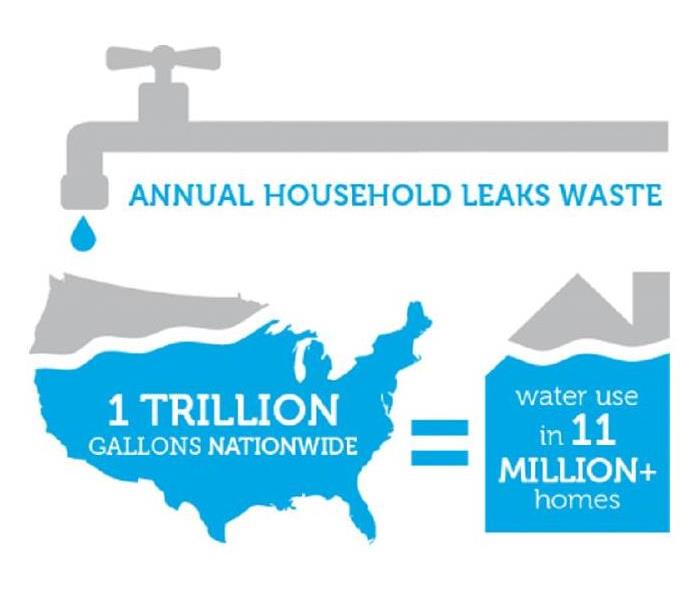Fixing Tiny Leaks Can Conserve Giant Amounts of Water and Help Residents Save Money In Greer
5/21/2018 (Permalink)
You are resting comfortably in your bed: the covers are just right, the room is the perfect temperature, and your head is on the cool side of the pillow. (Drip.) It is very quiet, no barking dogs, passing cars, and the kids have also tucked away into their own beds. (Drip.) You glance at the alarm clock, and you do not have to wake up for hours, plenty of time to get back to dreamland. (Drip. Drip.) You think that you hear a drip coming from the bathroom and check to make sure the faucets in the sink and shower are off, and they are, but you still hear the drip. “I will deal with it tomorrow,” you think to yourself and get back into bed. Only this time it isn’t quiet, you hear every drip like the second hand on a ticking clock. You fold the pillow over your head and try to go back to sleep. (Drip.) The alarm goes off, and you struggle to get out of bed, walk to the bathroom and step into a cold puddle of water. You say “But I checked all the faucets, and none of them were on,” as you follow the puddle to behind the toilet. You found the source of the drip. Not the way you wanted this day to begin.
Week 4 of National Building Safety Month’s theme is Safeguarding Our Water, and it focuses on how building codes help to conserve the water supply and help to ensure that it is clean. One of the best ways that you can contribute to conserving water is to take action if and when you have a scenario like the one above. Here are some tips from EPA.gov on how to quickly find leaks.
- Take a look at your water usage during a colder month, such as January or February. If a family of four exceeds 12,000 gallons per month, there are serious leaks.
- Check your water meter before and after a two-hour period when no water is being used. If the meter changes at all, you probably have a leak.
- Identify toilet leaks by placing a drop of food coloring in the toilet tank. If any color shows up in the bowl after 10 minutes, you have a leak. (Be sure to flush immediately after the experiment to avoid staining the tank.)Here is an excellent video from Spartanburg Water with some other ways to detect toilet leaks
- Examine faucet gaskets and pipe fittings for any water on the outside of the pipe to check for surface leaks.
Knowing how to test for leaks can help to prevent wasting water and reduce the potential for water damage to your property. You can rest easy because SERVPRO of East Greenville County is available to help if you ever need water damage restoration.





 24/7 Emergency Service
24/7 Emergency Service
